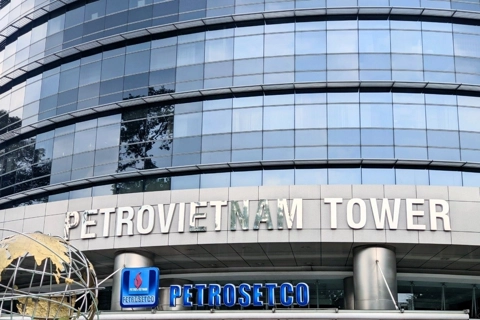Hanoi grasps opportunities to drive semiconductor industry growth
With Hanoi's advantages and readiness, a specific regulatory framework for the semiconductor sector can be created, enabling efficient investment promotion in the city.
Hanoi is actively leveraging various opportunities to promote and attract investment in its emerging semiconductor industry, said Nguyen Tran Quang, Deputy Director of the Hanoi Promotion Agency (HPA) at the seminar entitled "Semiconductor Industry Strategy: A New Driving Force for Vietnam and Hanoi" in Hanoi on December 3.
| Speakers discuss at the conference's fireside chat. Photo: Thanh Thanh |
To attract foreign direct investment (FDI) in the semiconductor sector, he said that the city is refining and implementing policies to encourage high-tech, high-value investments.
"Hanoi is also prioritizing administrative reforms to enhance the business climate, investing in highly skilled workers and expanding key infrastructure, especially in industrial zones focused on information technology and high-tech industries.
"As part of our strategy, we aim to develop high-tech zones that attract selective, environmentally friendly investments. Specifically, Hoa Lac Hi-tech Park is fully equipped with the necessary infrastructure, functional zones, and skilled workforce to connect researchers, businesses, and educational institutions, making it well-positioned to attract semiconductor development projects," he said.
Phung Viet Thang, Country Director of Intel Vietnam, suggested the semiconductor sector requires a talented workforce to guide Hanoi in its strategy for attracting investment in the semiconductor industry.
He noted that Vietnam is making significant strides in developing its high-tech workforce, supported by responsive policies from the highest levels of government. However, he said that the semiconductor industry needs outstanding personnel and advocated for unique investment plans to build this resource. "Vietnam should concentrate on particular areas to take the lead in semiconductor development."
Echoing this sentiment, Le Hoang Phuc, Director of Danang Semiconductor and Artificial Intelligence Center for Research and Training at the Danang Department of Information and Communications, remarked that the city is committed to training a workforce that meets market demands. Danang has established a training alliance with domestic and international companies like Intel and Synopsys.
Chu Duc Trinh, Rector of the University of Engineering and Technology at Vietnam National University in Hanoi, said, "Wherever there is talent, opportunities will follow." He also suggested policies to attract global leaders to Vietnam.
Propose strategies for semiconductor industry growth
| An overview of the event. Photo: Pham Hung/The Hanoi Times |
At the seminar, held on the sidelines of the Vietnam-Asia Smart City Summit 2024 on December 2-3 in Hanoi, speakers provided insights and policy recommendations for attracting investment, building a skilled workforce, and establishing effective collaboration models for the semiconductor sector in Vietnam.
Nguyen Khac Lich, General Director of the Department of Information Technology and Communications at the Ministry of Information and Communications, said Vietnam has made great efforts to secure a position in the global semiconductor supply chain and attract FDI into the semiconductor industry.
"As a country located at the center of Southeast Asia, Vietnam is well positioned to connect to major regional markets such as Singapore, Malaysia, Thailand and Indonesia, making it an ideal hub for semiconductor manufacturing and distribution," said Lich.
In addition, Vietnam's geographic proximity to China and India, the two large markets with high demand for technology products, offers opportunities for expanding exports and attracting investment from companies seeking access to these markets, he said.
"To be part of the global semiconductor value chain, Vietnam needs to go beyond traditional electronics and develop a new generation of electronics alongside the semiconductor industry, especially by integrating AI into all kinds of electronic devices," Lich said.
He said the country needs to master research and development in semiconductor and electronics technology and warned against becoming just a manufacturing hub, suggesting that the country leverage its geopolitical advantages, align with investment trends, and prioritize the development of electrical and water infrastructure, along with favorable policies and incentives.
"In the short term, Vietnam needs a small-scale chip fabrication plant with advanced technology to meet domestic demand, participate in the global supply chain, and ensure national security in case of supply chain disruptions," the director said.
HPA's Quang suggested that to attract semiconductor investment, the country should improve infrastructure and logistics to support all industries, particularly the semiconductor sector.
"I hope Hanoi's advantages and readiness will soon enable the creation of a specific regulatory framework for the semiconductor sector, allowing the capital to effectively attract investment," he said.












